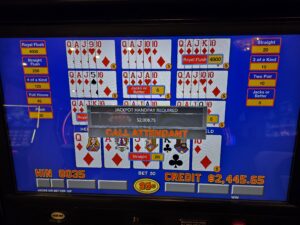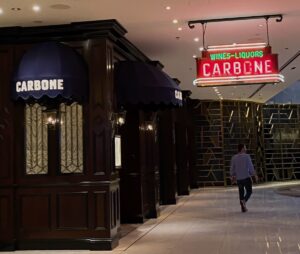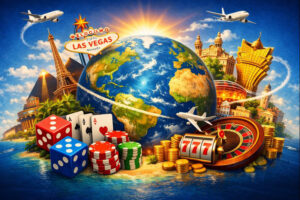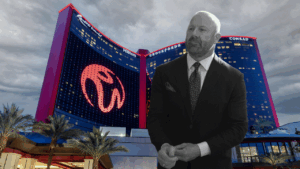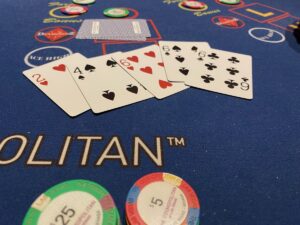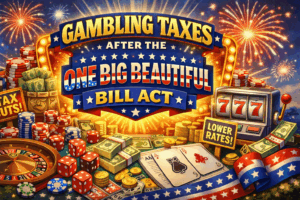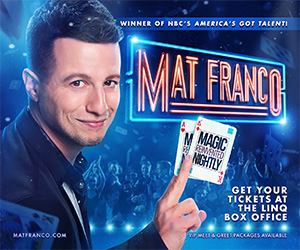Since you found me on TravelZork, I assume most of you are far more fluent in loyalty cards created by hotels and airlines than I am — but I’m probably more knowledgeable than you in casino player tracking systems. Let me tell you why I make that claim.
In 1993, at the age of 46, I moved to Las Vegas to be a professional blackjack player. Although I became pretty good at counting cards, casinos in Las Vegas are very good at spotting and eliminating card counters, so in less than a year I ran out of places to play. I went to Gambler’s Book Store to look for how-to books on other forms of gambling. I was willing to work very hard so I didn’t have to go out and get a “real” job!
At that time, the casino-beating options I heard about (other than blackjack) were live poker, video poker, and sports betting. I now know of several additional options, but those were all I discovered back in 1994. Since I had tried live poker previously, without much success, I decided to try video poker.
I bought every book on the subject, went home, and tried to master what I read. There weren’t many books (authors Bradley Davis, Lenny Frome, Dan Paymar, and Stanford Wong wrote the best books I found). They contradicted each other and didn’t give precise information. I decided I would try to learn the game and eventually write better books.
I acquired all the early software and taught myself the games. Eventually I made knowledgeable contacts and we shared information with each other. Over time, I discovered that the players’ clubs (usually called slot clubs in Las Vegas) all had their own idiosyncrasies. Learning the ins and outs of the players’ clubs was every bit as important as learning whether I should hold a suited ‘346’ over a suited ‘KJ’ in the same five cards. (Correct answer: Depending on the game, either might be best.)
Over the last 20 years, I’ve written ten books and taught between 300 and 400 different class sessions on video poker. One of the courses I teach at least annually is called, “What Video Poker Players Should Know About Slot Clubs.” Every time I teach it I update the material because things have always changed from the previous year.
Possibly more to the point, I’m primarily a player rather than a writer. Playing video poker has earned me multiple millions of dollars over the years. I’ve stayed in the nicest hotel suites — for free — eaten thousands of comped meals — for free — gone to see hundreds of shows — for free — and taken dozens of cruises — mostly for free.
Somehow, along the way, I’ve become the best known video poker writer and teacher in the United States. I’ve been contacted by Travelzork to produce a monthly column on various aspects of finding success at gambling. You’re now reading the first of these columns.
Okay. That’s enough about me. I know from experience that some of you will conclude “this guy just might know something that can help me” and others will conclude “what a blowhard! This guy is really full of himself!” The truth probably includes elements of both of these conclusions.
Let me address how slot clubs and airline frequent flyer programs are similar and how they are different. This month I’ll write about the similarities. Next month, I’ll address the differences.
1. Players’ clubs are designed for the benefit of the casinos — not the players. Even though smart players earn quite a bit from these players’ clubs, that’s not why they were originally developed.
Casinos designed the clubs so that they could get your name, address, and certain other information about you. Why? So they could figure out a good way to get you to come back and lose some more money! Generally speaking, as in many businesses, getting existing customers to pay a return visit is easier than getting a new customer.
How do they get you to give up your personal information? They bribe you! Often there’s an introductory offer (“Earn 50 points on the day you sign up and get a free buffet!” or “We’ll double all the points you earn in the first 24 hours!” or “Just for signing up, you’ll get a free spin that’s worth UP TO $500!” Of course, you usually only get $3, $5, or some similar small prize, but occasionally they give away the top prize so they can make the somewhat misleading “up to” claim).
After the introductory offer, they offer continued goodies. Perhaps they offer “cash back.” Some percentage of your total bet (say 0.1% or 0.67% or whatever) is returned to you. Sometimes in cash; sometimes in free play; sometimes in “comps” (i.e., complimentaries) that can only be spent at the gift shop, hotel, or restaurants.
Sometimes they’ll send you mailers. (“Come in on Tuesday, October 13, and we’ll give you $20.”) If you live three miles away, you’re probably going to go in and collect it. If you live several thousand miles away, you’re not going to make a special trip for that. (Well, you shouldn’t. Some players use any excuse whatsoever to return to a casino. These players are not called winners.)
Sometimes there are free room nights offered to you; sometimes food (“Up to $250 in meals.”); sometimes show tickets (“Come see Celine Dion”) or tickets to a sporting event. Sometimes they’ll pick up your travel expenses (“Play at least two hours and we’ll reimburse up to $600 in airline fares!); sometimes you receive an entry to a tournament or a giveaway (“One free entry into our $100,000 guaranteed slot tournament!”); whatever. Casino marketing directors are very creative in finding ways to bribe you to return to their property.
Belonging to a players’ club makes you more likely to play at that casino in the future. Assume you really don’t care whether you play at the Harrah’s casino in Las Vegas or the Mirage which is right across the street. If you’ve already been earning Total Rewards points, that will tip the scale towards playing at Harrah’s. If you’ve already been earning Mlife points, that’ll tip the scale in the other direction.
They want you to think, “Wow, this is great,” but they also know that on average, players who take advantage of these offers lose more money to the casino than the offers are costing the casino. That’s smart business on their part.
In later columns, I’m going to address how you can lose less than average. Learning how to win in the casinos is relatively tough (casinos are designed to be money-making enterprises, after all), but learning how to pay considerably less than retail for casino vacations is a manageable goal for most adults.
2. Some slot clubs allow you to earn at one place and spend at others. On this site you probably know that American Airlines is a member of OneWorld Alliance, teaming up with British Airways, Japan Airlines and about a dozen others. There are likewise a number of “mega-clubs” at American casinos. ‘Total Rewards’ unites Harrah’s, Caesars, Horseshoe, Rio, and several other brands. Mlife (yes I know that looks like a typo) has several casinos in its chain. There are a number of smaller chains as well.
3. The previous paragraph listed partners who all offered similar services. Casinos often partner with other unrelated businesses. You might use your slot club points to buy gasoline or groceries at a particular supermarket. Showing your card may also earn you a discount at other places.
4. Every players’ club offers special deals on a regular basis. It might be “Double points between midnight and 6 a.m.,” or “Two-for-one margaritas on Tuesdays,” or “Every day in May we’re giving away a free automobile,” or “Hit a royal flush and receive a free logo jacket,” or “Come in every Saturday for your free gift,” or “Earn drawing tickets all week long and every Friday we’ll give away $50,000,” or “The thirty players from June through Septembers who play the most earn a free 7-day cruise to Alaska,” or who knows what next time?
This means you have to “keep up to date.” Just like you can order an airline ticket any old day, you can show up at a casino and just play. But learning what specials are in effect is a great way to save money.
5. Points expire. You have to play regularly to keep up your status. Often it’s something like “If you have no play in a year, your old points expire,” but every club has slightly different rules, as do many airline and hotel loyalty cards.
6. It’s often possible to double up or triple up on promotions. Promotions are often designed to be used separately, but smart players don’t stick to the original design. If you get an offer for money, free room nights, and food credit any time between now and December 23, booking that vacation at the same time as they are offering other goodies is a smart move. (Sometimes you can also cross-book promotions across organizations. That is, if you can book a casino trip at the same time an airline is offering a special deal, so much the better. When you’re looking to save money, you don’t really care if the money you save comes from one pocket or several.)
7. In a vein similar to the last item, sometimes you can book a trip to two or more nearby casinos the same weekend. Let’s say both Caesars and Bellagio both offer you “show up money” for the same weekend — sometimes including airfare. If you’re flying from far away, it makes a lot of sense to collect from both companies! Is it allowed to collect your airfare from two different casinos? Sure. Why not? You don’t TELL Caesars that you already collected from Bellagio, but if you fulfill the requirements of the offer, they will pay you. Since it’s easy to receive your tickets via email, you can print off as many copies as you like!
8. There are often tiers in a players’ club — for example, silver, gold, diamond, and platinum, although the names vary greatly. Benefits differ widely too. For the “higher” tiers in a particular players’ club, you might receive a higher percentage of cash back, free cruises, special “no waiting” lines, special invitations to events, extra “free tickets” for drawings, VIP parking, “members only” lounges, two free show tickets a month, bigger discounts at the gift shop and spa, access to hosts, etc.
In the pictures accompanying this article, the ICON card is the highest tier in the Penn National players club. The South Point card is an example of a casino that does not use tiers.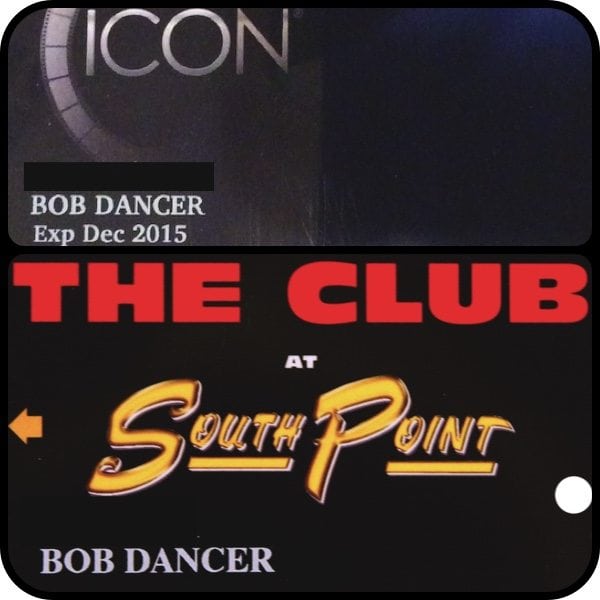
9. There are big differences between properties. Experienced travelers know that the Delta SkyMiles system works a little differently on Air France/KLM than it does on Delta Airlines and different still on Alaska Airlines or Virgin Atlantic. Although each of these airlines has a partnership with Delta SkyMiles, each has their own management team and they make their own decisions. In addition to loyalty programs this can also be seen in the varying hard product (seating) offered by these airlines, even when they are closely aligned. For example Delta offers a consistent 1-2-1 business class product on all of their wide-body international flights. Air France/KLM has a different business class product that varies from 2-3-2 seating to 1-2-1 seating configurations in business class. The same is true for casinos.
Don’t assume that Harrah’s Atlantic City has the same policies as Harrah’s New Orleans, Harrah’s Las Vegas, or Harrah’s Lake Tahoe. Many features of the program are identical from property to property, but players who get the most out of the programs learn to identify the differences. You can bet we’ll revisit this again in my column next month when I talk about the differences between these casino players’ clubs and the loyalty clubs for airlines and hotels.
10. There are websites discussing how to take advantage of these programs. You obviously know about TravelZork, but there are others. There are also various gambling-related sites which provide a huge amount of information about the players’ clubs and the games.
That’s enough for this month. Next month we’re going to be talking a lot about the differences among these programs. This is, by far, much more valuable than understanding the similarities. Players who succeed at gambling learn the ins and outs of these players’ clubs backwards and forwards.
Bob Dancer is the premier video poker writer and teacher in the world. He has created a number of how-to-win products available at bobdancer.com. He co-hosts a weekly radio show called Gambling with an Edge, which is also archived on his website. (The show is also available on iTunes.)
Bob Dancer is the premier video poker writer and teacher in the world. He has created a number of how-to-win products available at bobdancer.com. He co-hosts a weekly radio show called Gambling with an Edge, which is also archived on his website.



